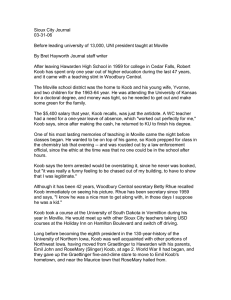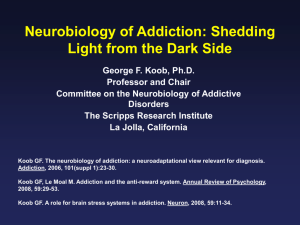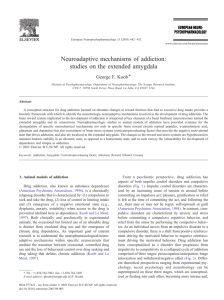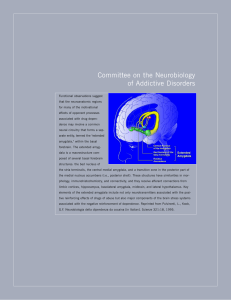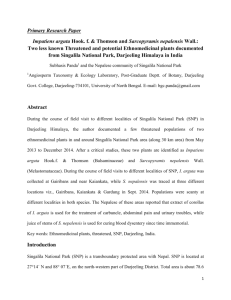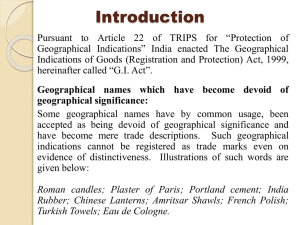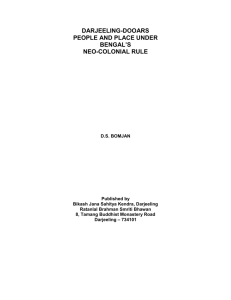What Happens When We Read? - BSWP Service Learning and Inquiry
advertisement
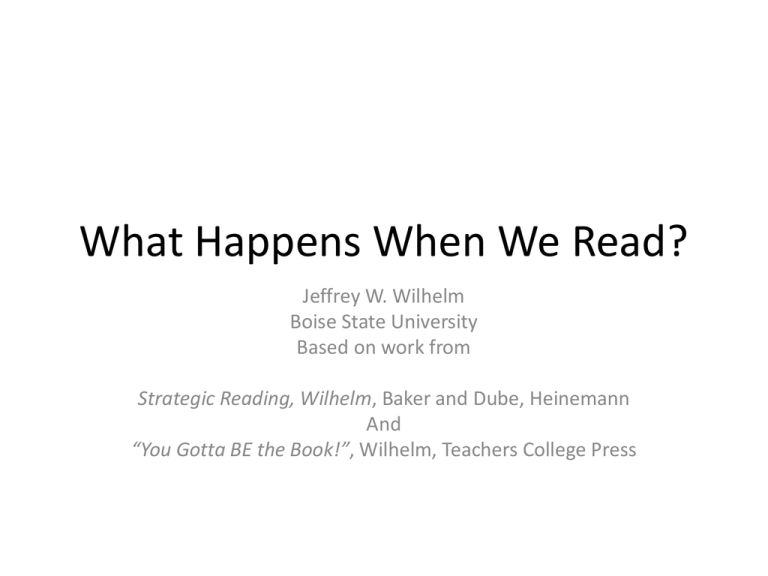
What Happens When We Read? Jeffrey W. Wilhelm Boise State University Based on work from Strategic Reading, Wilhelm, Baker and Dube, Heinemann And “You Gotta BE the Book!”, Wilhelm, Teachers College Press Questions about Meaning • What does the text mean? New Criticism (cf. Info-transmission learning theory) • What does the text mean to me? Reader Response/Subjective Reader Response (cf. student centered discovery theory) • How does the author expect me to read this text, and how do I feel about that? Transactional Reader Response/Authorial reading/Reading with Sociological Imagination (cf. Vygotskian sociocultural theory) Where is the meaning? • IN THE TEXT? • IN THE READER? • IN THE CONVERSATION BETWEEN THE READER AND THE TEXT/INTELLIGENCE BEHIND THE TEXT? • Figure 3.1 But WHERE is the MEANING? • My wife and my mother-in-law But where is the meaning? • In your head? • In the text? • In the transaction between text and self? Reading is conventional Reading requires the right orientation and filling in the gaps Reading requires a clear purpose and task-orientation The Vapy Koobs • • • • • • • • • The Vapy Koobs desaked the citar molently The franching tigs spang grushly from the soog The lipendoof canished the tasar silently While dospy gubs ferlummed the sinting noog. O glimp the koob, O glimp the koob, Darjeeling! The ampting haig baks ummer from the pum The hippendome sigs bommer and derveling While hashims prag in limper and in lum. • • • • • • • • The Vapy Koobs desaked the citar molently The franching tigs spang grushly from the soog The lipendoof canished the tasar silently While dospy gubs ferlummed the sinting noog. O glimp the koob, O glimp the koob, Darjeeling! The ampting haig baks ummer from the pum The hippendome sigs bommer and derveling While hashims prag in limper and in lum. • Answer the following questions in complete sentences: • • What happened to the citar? How was this done? • • How did the tigs spang? And where did they spang from? • • • • • • • • • The Vapy Koobs desaked the citar molently The franching tigs spang grushly from the soog The lipendoof canished the tasar silently While dospy gubs ferlummed the sinting noog. O glimp the koob, O glimp the koob, Darjeeling! The ampting haig baks ummer from the pum The hippendome sigs bommer and derveling While hashims prag in limper and in lum. • • • • Answer the following questions in complete sentences: While all this was going on, what were the gubs doing? What is Darjeeling asked to do with the koob? For extra credit: how do we know that “glimping” is central to the meaning of the poem? Blinds for sale! Blinds for Sale! • Goose hunting season opens soon! She ran quickly towards the rising sun She ran quickly towards the rising sun • Knowing that fresh oats would be in the barn! • • • • • • • • • • • • • • • • • • With hocked gems financing him Our hero defied all scornful laughter That tried to prevent his scheme Your eyes deceive He had said An egg Not a table typifies this unexplored planet Now three sturdy sisters sought proof Forging along sometimes through calm vastness Yet more often over turbulent peaks and valleys Days become weeks As many doubters spread fearful rumors Abut The Edge At last from somewhere Welcome winged creatures appeared Signifying momentous success • A newspaper is better than a magazine. A seashore is a better place than the street. At first it is better to run than to walk. You may have to try several times. It takes some skill but is easy to learn. Even young children can enjoy it. Once successful, complications are minimal. Birds seldom get in the way. Rain, however, soaks in very fast. Too many people can cause problems. It can be very peaceful. A rock will serve as an anchor. If thing break loose, however, you will not get a second chance. • The procedure is quite simple. First you arrange things into different groups. Of course, one pile may be sufficient depending on how much there is to do. If you have to go somewhere else due to a lack of facilities that is the next step, otherwise you are pretty well set. It is important not to overdo things. In the short term this may not seem important but complications can easily arise. A mistake can be expensive as well. At first, the whole procedure will seem complicated. Soon, however, it will become just another facet of life. It is difficult to foresee any end to the necessity for this task in the immediate future, but then one can never tell. After the procedure is completed one arranges the materials into different groups again. They can be put into their appropriate places. Eventually they will be used once more, and the whole cycle will be repeated. Half the group close your eyes! •Real Estate Agents •Robbers • The house is set back from the road amid three acres of beautiful hardwoods. The nearest neighbors are over a quarter mile away. On the other side of the street there is a small airport. You are five miles from a small town with excellent schools. A door on the side of the two-car garage is always open and provides easy access into the house. There are four other ways to enter and leave the house, including an old fruit cellar tunnel that leads out into the woods. The kitchen has been redone recently and has brand new Jenn-Air appliances. This connects to the living room, with a large bay window overlooking the front lawn. An original Hogarth print hangs on the wall and an antique Oriental vase stands in the corner. An open staircase leads upstairs to four bedrooms. There are two baths, one of which is connected to the master bedroom. There is an open jewelry case, four passports, and three cell phones and a bundle of cash on the bureau and a Moroccan rug on the floor. One of the bedrooms is currently being used as a study and contains a high-end computer and two laptops. There is a full attic where an observatory has been set up. A computerized telescope is set up near a dormer window and is trained on the airport. What is important to remember? What do you remember? • Purpose determines how you read and engage, what you pay attention to, and what you remember. • The importance of purpose cannot possibly be overestimated! Dear J_____, I c___’t m______ y____. I d___’t l____ y____ a_______. I l____ y____ br_______. (or be___ f_____.) (or bo_________.) S___________, J__________ Robin Hood, Chapters 1 and 2 • • • • • Where does Robin live? What sport is he good at? Why did Robin live where he did? Why were times hard for people? Name one of Robin’s band’s vows. Do you agree with it? • Describe Little John. How does his name fit him? Latest NAEPs and PISA results tell us . . . • A man came inside and sat down in the very last booth. He ordered and ate bacon, eggs, and wheat toast. One hour later he finished his third cup of decaffeinated coffee. He left, but forgot his umbrella and the morning’s copy of The Wall Street Journal. He left a big tip, smiled at the waitress, and said goodbye to her. If you can only read literally • A man came inside and sat down in the very last booth. He ordered and ate bacon, eggs, and wheat toast. One hour later he finished his third cup of decaffeinated coffee. He left, but forgot his umbrella and the morning’s copy of The Wall Street Journal. He left a big tip, smiled at the waitress, and said goodbye to her. • Where was he? • What did he order? If you can only read literally • A man came inside and sat down in the very last booth. He ordered and ate bacon, eggs, and wheat toast. One hour later he finished his third cup of decaffeinated coffee. He left, but forgot his umbrella and the morning’s copy of The Wall Street Journal. He left a big tip, smiled at the waitress, and said goodbye to her • Why did he come here? If you can only read literally? • A man came inside and sat down in the very last booth. He ordered and ate bacon, eggs, and wheat toast. One hour later he finished his third cup of decaffeinated coffee. He left, but forgot his umbrella and the morning’s copy of The Wall Street Journal. He left a big tip, smiled at the waitress, and said goodbye to her • What was the weather like when he came? Departed? • What kind of person might he be? What can you infer? • A poorly clothed man had been lost for days in a steady rain and sleet storm. To eat he had had only a few nuts that he found under the falling leaves in the forest through which he walked. Finally he came upon a large house under some giant trees; he went to the house to beg for food and shelter. Volunteer to read • The boy’s arrows were nearly gone so they sat down on the grass and stopped hunting. Over at the edge of the woods they saw Henry making a bow to a little girl who was coming down the road. She had tears in her dress and also tears in her eyes. She gave Henry a note which he brought over to the group of young hunters. Read to the boys it caused great excitement. After a minute but rapid examination of their weapons, they ran down the valley. Does were standing at the edge of the lake making excellent targets. • At least four theoretical variants of the interpretive semantic theory have appeared in the literature since Chomsky first grappled with the problem of semantics. In the late 1960s, alternatives were offered by Lakoff, McCawley and Ross. Their arguments centered around the idea that it is not possible to separate the semantic and syntactic components of the grammar. According to these linguists, there is no single base phrase marker but, rather, sentence generation begins with the semantic component and subsequent interaction between lexical insertion and transformational rules leads eventually to the surface structure and the application of the phonological component. Where does meaning come from? Or: is the brian a prisoner of the I? • Nomral reding is a knid of hgih-spede bessuing game, which explians why we find it difficult to prrof-reed. The raeding porcess is incredbidly flexilbe and can cope with all kinds of worng infromation, such as revresed lettres, missprimts, puchunations errers and chainges in tiep font, eny of witch wood compeltly fox a commutre. But so long as sence is coming over the I bounds on. What does hold up the porcess is unfamiliar langgage conturctions, so a when of jggled the about are all sensence words the brian gets into an awful staet tyring to recnocile a snesible anticipated masseage and nonsesnical messaeg which was actually received. • The none tolled hymn she had scene a oare of bear feat in hour rheum. Reading is more complicated than you think! BEFORE READING or any kind of LEARNING, to be successful, WE must • Activate background knowledge • Build background knowledge (both conceptual and procedural) necessary for understanding • Have a clear and engaging purpose • Understand the genre conventions of the text • AS STUDENTS READ AND LEARN, THEY MUST • Be able to comprehend the facts and infer connections • Critique and apply what they are learning
